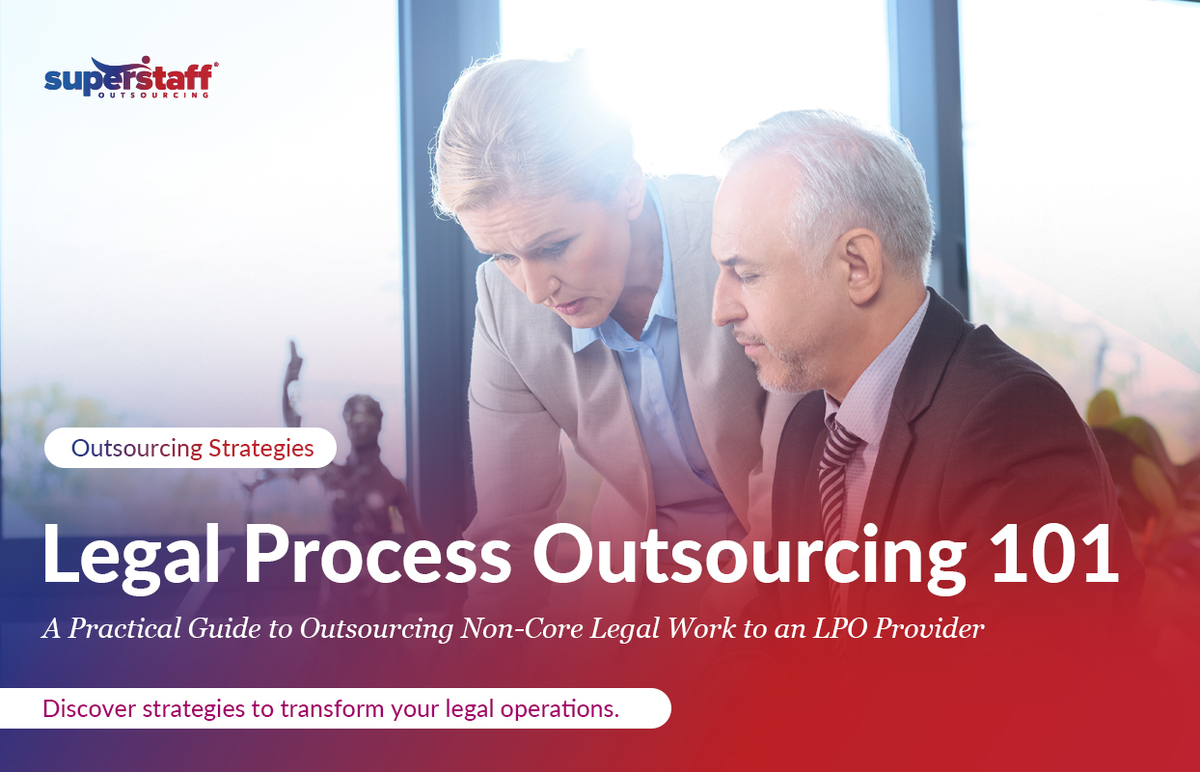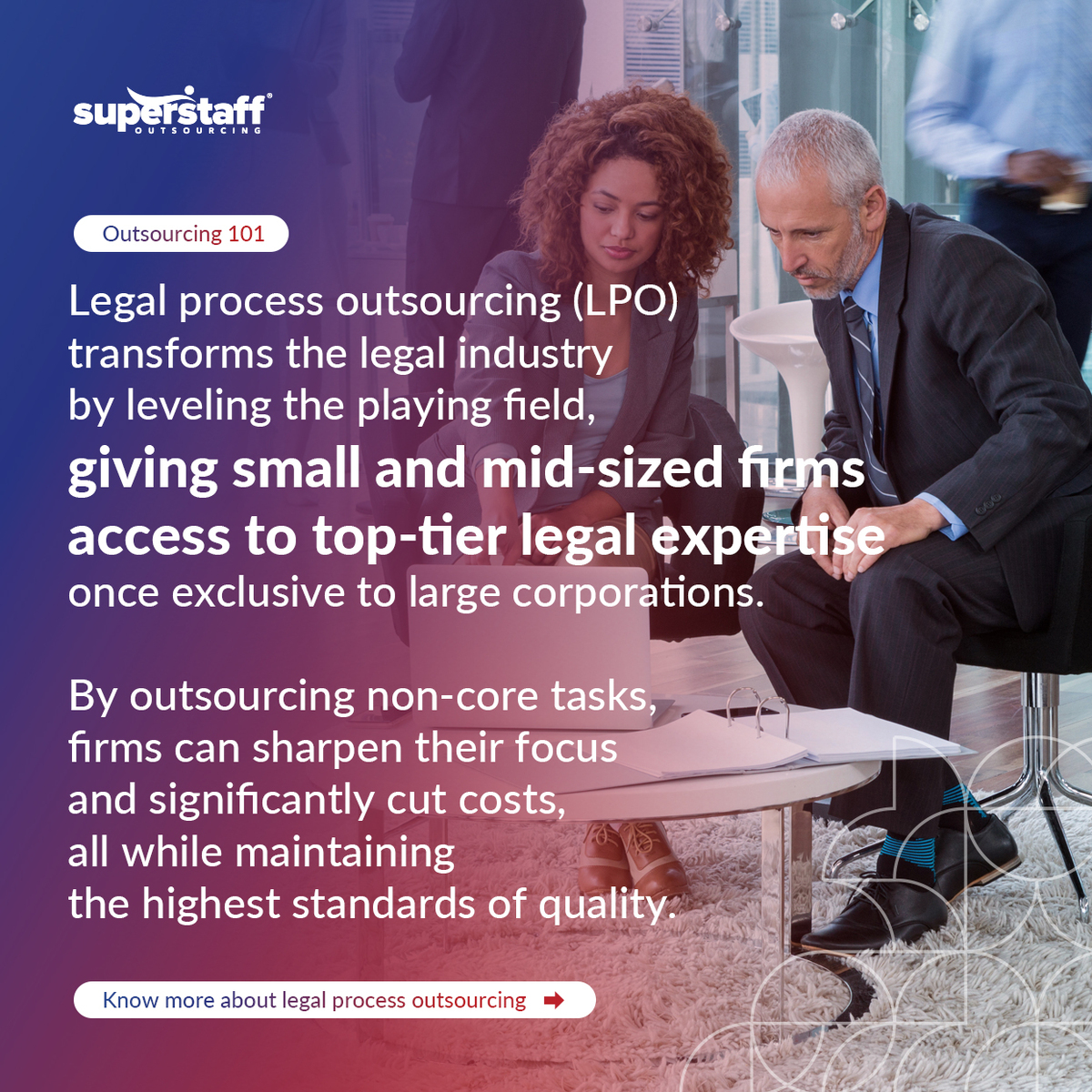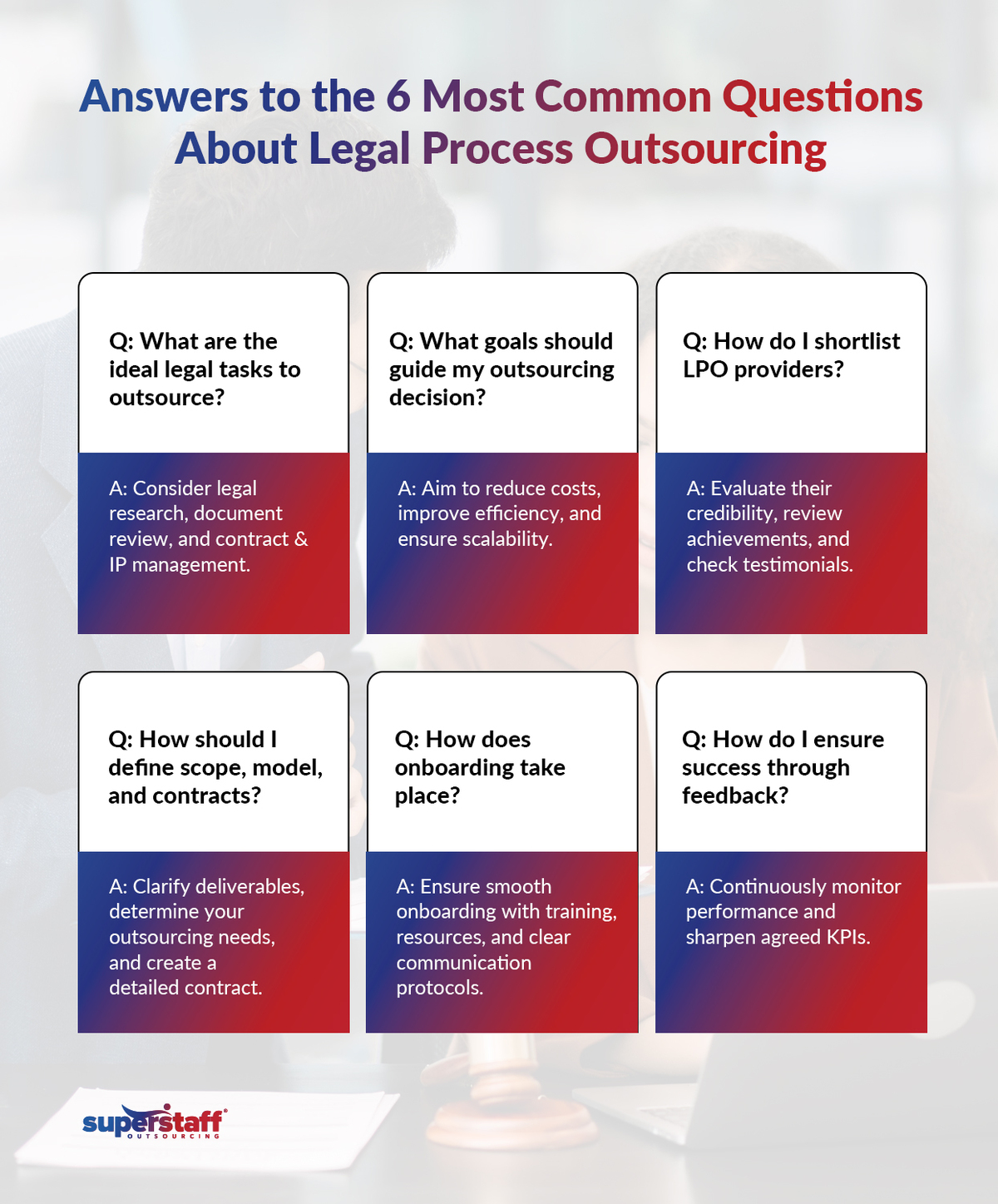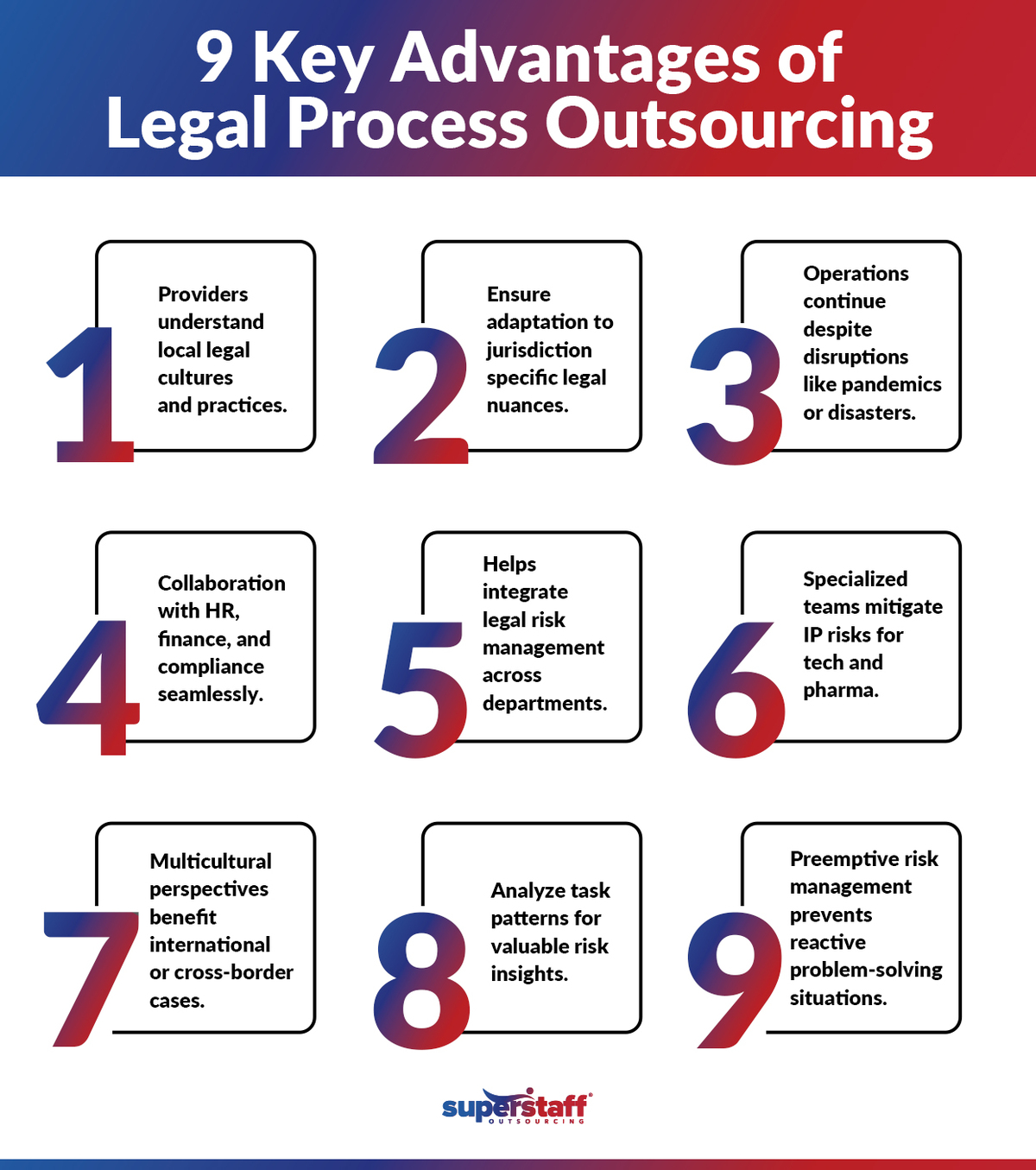
Legal Process Outsourcing (LPO) presents a practical and cost-effective solution for managing non-core legal work, allowing your in-house team to focus on more strategic, high-value tasks. In today’s increasingly competitive legal landscape, legal outsourcing services are no longer just an option; they are a strategic advantage for firms looking to enhance efficiency and remain competitive.
By leveraging LPO, small law firms can streamline their operations, reduce overhead, and scale their services without the added burden of staffing and resource management.
This comprehensive guide outlines a step-by-step approach to outsourcing legal services to trusted LPO providers, empowering you to confidently navigate the process and make informed decisions that benefit your firm’s long-term success.

Identifying Non-Core Legal Tasks Suitable for Outsourcing
The first critical step in legal process outsourcing (LPO) is distinguishing between your core and non-core legal functions. Core tasks directly contribute to your firm’s revenue and align with its mission. These are the primary services that define your firm’s value proposition.
Non-core tasks, while essential to your firm’s operations, fall outside your core expertise. However, they still play a vital role in improving overall performance. Common examples of non-core legal tasks often outsourced include legal research, document review, contract management, and intellectual property (IP) management.
Legal Research
Legal research is foundational to legal practice, requiring a deep understanding of case law, statutes, and doctrines. However, the research’s complexity and time-intensive nature can strain your in-house resources. Outsourcing this function to skilled professionals allows your firm to maintain focus on high-value tasks such as client relationships and case management while ensuring detailed, high-quality research is completed efficiently.
Document Review
Document review involves meticulously analyzing sensitive documents for compliance, relevance, and accuracy. Given the volume and complexity of legal documents, this task is both time-consuming and resource-intensive. Outsourcing document review to specialists accelerates the process and reduces the risk of errors, ensuring documents are thoroughly vetted and compliant with legal standards.
Contract and IP Management
Contract management is critical to ensuring the accuracy and enforceability of agreements between parties, whether they involve transactions, employment, or other legal obligations. Errors in contract management can lead to costly disputes. Similarly, intellectual property (IP) management protects a company’s creative assets, enforcing copyright and trademark protections. Forbes notes that IP theft can result in billions of dollars in losses annually, underscoring the need for stringent IP protection.
Outsourcing contract and IP management to experts helps ensure these crucial tasks are handled efficiently, reduce errors, and enhance protection for clients.
After identifying the tasks suitable for outsourcing, the next step is setting clear, realistic goals to ensure your LPO strategy aligns with your firm’s objectives.
Setting Clear Objectives for Outsourcing Legal Services

The next crucial step in outsourcing legal services is setting clear and realistic objectives. Defining precise goals ensures your outsourced legal team aligns with your expectations and provides a transparent reference point for the outcomes you aim to achieve. Common objectives for outsourcing include cost savings, improved efficiency, access to specialized expertise, and increased scalability and flexibility.
Cost Reduction
One of the primary benefits of outsourcing, particularly in the Philippines, is cost efficiency driven by lower labor costs. Despite the country’s lower cost of living, the quality and professionalism of legal services remain high. In addition, outsourcing helps cut overhead expenses related to hiring and training in-house staff.
To illustrate, according to the latest data from Indeed, the average monthly salary for a U.S.-based paralegal is $4,277. In comparison, paralegals in the Philippines earn an average of 29,208 Philippine pesos per month — approximately $521. This significant difference highlights the cost-saving potential without compromising service quality.
Operational Efficiency
A recent Bloomberg survey revealed that many attorneys are overworked and struggling with fatigue due to their heavy workloads. Attorneys often work through their days off, further exacerbating stress and making it difficult to maintain a work-life balance.
Outsourcing non-core tasks to legal service providers can help alleviate this burden. By delegating routine but essential tasks, you reduce the workload of your in-house team, prevent burnout, and improve operational efficiency, ultimately setting your firm up for long-term success.
Scalability and Flexibility
Contrary to the misconception that legal process outsourcing (LPO) is only suitable for large firms, it offers flexibility and scalability for all sizes. With the rising demand for legal services — particularly as firms adapt to digitalization and other emerging trends — outsourcing allows your firm to expand operations when demand peaks and scale back during slower periods.
By establishing clear objectives, you can move forward to the next critical step: conducting thorough research on potential outsourcing partners to ensure alignment with your firm’s goals.
Conducting Thorough Research on LPO Providers
Thoroughly vetting potential Legal Process Outsourcing (LPO) providers is critical to ensure they meet your firm’s standards. Assess their reputation, compliance practices, security measures, technological capabilities, and cultural fit to ensure a successful partnership.
Reputation and Track Record
The legal sector demands high expertise, and your outsourcing partner should be no exception. When evaluating potential providers, ensure their track record aligns with your firm’s expectations. Look for providers with a strong reputation for delivering high-quality services and measurable results. Begin by reviewing their experience in the legal field, examining the scope of services offered, and assessing their impact within the industry. Client testimonials and case studies indicate whether a provider can meet your outsourcing objectives.
Compliance and Security
Compliance with legal standards and robust data security protocols are non-negotiable when choosing an LPO provider. As a law firm, you handle susceptible client data; any breach could have severe consequences. Therefore, your outsourcing partner must adhere to strict data protection regulations and demonstrate a strong cybersecurity framework.
Consider this: only 26% of law firms feel confident in their ability to withstand cybersecurity threats. The risk of cyberattacks is ever-present, and ensuring your partner has the necessary safeguards is essential for protecting your firm’s and your client’s information.
Technological Capabilities
Technology plays a crucial role in modern legal operations. Evaluate whether your potential outsourcing provider utilizes advanced technologies, such as automation and AI, to streamline workflows. A partner with a robust IT infrastructure and support services will enhance operational efficiency and ensure your firm stays ahead in a rapidly digitalizing industry.
Once you’ve assessed these factors, the next step is to draft a comprehensive Scope of Work (SOW) to narrow down your potential LPO partners. Let’s explore how to approach this process effectively.
Preparing a Detailed Scope of Work (SOW)
A well-defined Scope of Work (SOW) is essential for communicating your objectives and expected outcomes to your LPO provider. While the SOW includes several key elements, it should be tailored to meet your needs. Critical components of the SOW include expected deliverables, performance metrics, and clear communication protocols.
Expected Deliverables
Begin by clearly defining the deliverables you expect from your LPO provider. Outlining these expectations prevents misunderstandings and ensures both parties are aligned on goals. After specifying the deliverables, set realistic targets and establish a system for monitoring progress. These goals can be measured through timelines or specific output metrics. Clear expectations around deliverables promote transparency and foster accountability, ensuring your legal outsourcing goals are consistently met.
Performance Metrics (KPIs)
Key performance indicators (KPIs) provide a structured way to assess your LPO provider’s performance. These metrics should align with your firm’s overall objectives, helping ensure your provider delivers value. Consider the following KPIs:
- Client satisfaction: Measure client feedback to assess how well your provider meets expectations.
- Cost of client acquisition (CAC): Track the expenses of acquiring new clients, including marketing and time spent.
- Law firm profitability: Analyze total earnings to evaluate whether the outsourcing arrangement contributes to financial efficiency.
- Accuracy, timeliness, and compliance: Evaluate your provider’s work for precision, adherence to deadlines, and compliance with legal and internal standards.
Communication
Establish clear communication protocols within the SOW. Regular updates, scheduled reviews, and feedback loops are essential to ensure the outsourcing relationship remains productive and aligned with your firm’s evolving needs.
By setting a comprehensive SOW, you’ll be well-prepared for the next step in the outsourcing process: selecting your engagement model and negotiating your contract.
Choosing the Right Engagement Model
The success of your outsourcing partnership hinges on selecting the appropriate engagement model, which should be tailored to your firm’s operational requirements and legal outsourcing needs. The three primary engagement models include project-based, dedicated teams, and hybrid models. Each offers distinct advantages based on your firm’s specific objectives.
Project-Based Model
A project-based model is ideal for outsourcing one-time legal tasks or specific projects. This model is best suited for firms that need external support for clearly defined, limited-scope projects. Suppose your in-house attorneys are equipped to handle the bulk of a project but require additional expertise or resources for a particular task. In that case, this model offers a cost-effective solution. To ensure success, be precise and transparent about the goals and deliverables.
Dedicated Teams Model
For larger, more complex legal projects, the dedicated teams model provides an entire team of legal professionals to manage ongoing or extensive tasks. This model offers flexibility by allowing your firm to leverage a wide range of expertise. Whether you need support for litigation, compliance, or contract management, a dedicated team ensures you have the resources to address multiple needs simultaneously. It’s beneficial when managing large-scale or continuous legal projects that require consistent oversight.
Hybrid Model
The hybrid model combines the flexibility of project-based work with the long-term benefits of dedicated teams. This model is ideal for firms looking to scale their outsourcing efforts over time. Whether your firm needs to adjust based on workload fluctuations or balance short-term and ongoing projects, the hybrid model provides scalability and adaptability. It benefits law firms experiencing seasonal demand shifts or unpredictable legal workloads.
Once you’ve selected the most suitable engagement model for your needs, the next step is negotiating the contract to solidify the partnership.
Negotiating a Contract
A well-structured contract is the foundation of a successful LPO engagement. It must clearly outline essential terms such as pricing, confidentiality, and Service Level Agreements (SLAs). To maintain flexibility, include termination clauses that allow both parties to adjust terms if conditions change during the partnership.
Pricing Structure
Your pricing structure should align with your outsourcing goals, engagement model, and overall strategy. Discuss billing preferences with your LPO provider based on hourly rates, fixed pricing, monthly salaries, or retainer models. Standard pricing options include:
- Fixed Price: A predetermined service amount typically paid monthly or annually. This model provides predictability and financial stability.
- Cost-Reimbursable: Your provider tracks and recovers approved expenses, adding a percentage markup as compensation.
- Incentive-Based: You reward your provider based on performance, often tied to high-demand periods or overtime work, motivating efficiency and results.
Service Level Agreements (SLAs)
SLAs ensure that your provider’s performance aligns with your firm’s standards. A well-defined SLA should include detailed deliverables, deadlines, and excluded services to avoid confusion. Performance metrics (KPIs) should also be specified to track compliance with agreed-upon goals. By documenting expectations in the SLA, you create accountability and a shared understanding of service quality.
Confidentiality
Confidentiality is paramount in legal outsourcing. Your contract must include comprehensive data protection clauses to safeguard sensitive client information. Ensure your LPO provider complies with cybersecurity regulations and holds relevant certifications, such as ISO 27001. Review their data protection practices to align with your firm’s standards and protect against potential breaches.
Clearly outline all contract terms. Once the agreement is signed, you can move forward with the next crucial step: onboarding your LPO partner effectively to ensure a smooth transition.
Onboarding Your LPO Provider

A well-executed onboarding process is critical to the success of your LPO partnership. According to a Forbes and OnePoll study, 81% of employees feel overwhelmed during onboarding. Focusing on key onboarding practices is essential to ensuring a smooth experience for your LPO provider.
Training and Guidelines
Introduce your LPO provider to your firm’s policies, workflows, and legal standards. This alignment is crucial for maintaining consistency and ensuring your provider operates in sync with your firm’s processes. Effective training will familiarize the outsourcing team with your firm’s operations, resulting in a more productive and efficient collaboration. Additionally, sharing your legal expertise can help streamline workflows and foster better teamwork.
Access to Resources
You must provide your LPO provider with the necessary resources along with training. This includes software, legal databases, hardware, and document templates. Equipping your provider with the same tools used internally strengthens strategic alignment and fosters better collaboration. Remember, this is a two-way process. Encourage your LPO partner to share their resources and tools, further enhancing mutual efficiency.
Communication Protocols
Clear and structured communication is essential for successful collaboration. Establish protocols that detail how and when communication should occur, including channels for routine updates and urgent matters. Effective communication ensures that performance can be monitored in real-time and that both parties remain aligned. It’s also important to set regular feedback sessions to address ongoing concerns and opportunities for improvement.
A solid onboarding process ensures your LPO provider is prepared to meet their deliverables. However, successful partnerships require ongoing effort. The next step is continuous performance monitoring to maintain and optimize the relationship.
Monitoring and Reviewing Performance
Regular performance reviews are essential to ensuring the long-term success of your outsourcing relationship. Ongoing evaluation maintains quality, operational efficiency, and alignment with your objectives. Tracking key performance metrics allows you to identify areas of success and pinpoint opportunities for improvement.
Accuracy and Timeliness
Accuracy and punctuality are critical in the legal sector, where even minor errors can have significant consequences. The legal industry demands high-quality outputs and the ability to meet tight deadlines. Monitoring your LPO provider’s performance in terms of both accuracy and timeliness ensures operational efficiency and boosts client satisfaction. Regular assessments of these metrics help maintain high standards and ensure your provider delivers consistent, error-free work on schedule.
Transparency and Communication
Effective communication is the cornerstone of a productive outsourcing partnership. Evaluate your LPO provider’s transparency and responsiveness to ensure both parties are aligned throughout the engagement. Clear and open communication fosters trust and mutual understanding, driving productivity and a seamless working relationship. Regular check-ins and status updates ensure you stay informed and address any issues promptly.
Compliance
Adherence to legal and regulatory standards is an ongoing obligation, not a one-time task. As you regularly share sensitive legal information with your LPO provider, monitoring their compliance with data protection regulations and industry-specific requirements is crucial. Ensure your provider maintains a consistent, ethical approach to safeguarding your firm’s and client’s data, mitigating potential risks throughout the partnership.
With consistent performance monitoring, regular reviews, and open feedback loops, you can foster continuous improvement and strengthen your LPO partnership. Next, let’s explore how to implement effective feedback mechanisms.
Implementation of Feedback Loops and Scaling
Implementing feedback loops and assessing scalability are crucial steps to ensure continuous improvement in your LPO partnership.
Feedback Mechanisms
Regular feedback loops— bi-annually or monthly — enable both parties to provide constructive assessments that promote growth and enhanced performance. Feedback should be a two-way process. Encourage your LPO provider to share insights and constructive criticism. This will allow you to address areas for improvement and foster a more collaborative and transparent partnership. This mutual exchange strengthens the relationship, driving long-term success.
Scaling Your LPO Team
As legal demands fluctuate, your firm must remain adaptable. Regularly evaluate your outsourced tasks to determine whether scaling up or down is necessary for optimizing operations. Outsourcing’s flexibility enables your firm to adjust resources as the industry evolves. Scaling up your legal outsourcing services ensures your firm remains competitive, delivering streamlined services that enhance client satisfaction and boost your reputation.
By integrating feedback mechanisms and leveraging scalability, you position your LPO relationship for sustainable growth and long-term success.
Entrusting Your Legal Outsourcing Services to a Competent LPO Provider
Legal process outsourcing (LPO) involves delegating non-core legal tasks to an external provider, strategically enhancing your firm’s operational efficiency, reducing costs, and granting access to specialized expertise. Identifying which tasks to outsource and setting goals will help ensure successful service delivery.
If you’re seeking a trusted LPO partner focused on quality and efficiency, SuperStaff is here to support your legal needs. Our experienced paralegals and lawyers are adept at tailoring operational models to meet your requirements. Streamline your legal operations with SuperStaff and build a competent, efficient team that helps your firm thrive.






